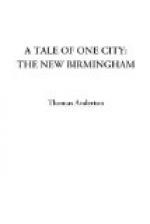Then, how I remember hearing Adelina Patti at the Festival of 1861. Oh! how the sweet girl singer charmed, indeed fascinated, her audience with her delightfully fresh voice, and by her attractive appearance and winning manner. How fatherly, and even tenderly, Costa seemed to watch over the little maiden, and his usual autocratic manner—for he was an autocrat at the conductor’s desk—seemed to soften when he came in contact with the pretty young Italian vocalist. Even the stern unbending general of the orchestra was once so touched with her delightful rendering of an air in one of his oratorios, that he was actually seen to imprint a paternal kiss upon her cheek.
It was also at the Festival of 1861 that I remember hearing Giuglini—the “golden-throated Giuglini,” as he was called. Was there ever such sweet, luscious tenor voice, or a more charming and graceful style of vocalization? He literally sang like a bird. He opened his mouth and the notes were warbled forth with exquisite volubility and ease. Giuglini’s voice had not the power and breadth which Sims Reeves could command, nor was his style so impassioned and fervent as Mario’s, but his tones and vocalization were something to hear once and remember always.
But I am pausing too long over details. Let me hurry on. I remember the disappointment with which Sullivan’s cantata “Kenilworth” was received at the Festival of 1867. The then young composer had made such a very “palpable hit” by his “Tempest” music that great things were expected from the new cantata he composed for Birmingham. But “Kenilworth” fell very flat, and nothing afterwards happened to stir it up into a success. Indeed, the work may almost be said to have died “still-born.”
I fancy Sullivan himself had some premonition as to the fate of his new composition. At least I know that I saw him in the Society of Artists’ Rooms on the day when his work was to be performed in the evening, and on my asking him how he was he smiled “a kind of sickly smile,” and told me he felt very squeamish.
How different was the fate of Mr. J.F. Barnett’s “Ancient Mariner.” Though the composer was a well-known musician no great things were expected from his new cantata, but it took the musical world by storm. It achieved instant success, and although it was regarded by many as being nice innocent “bread and butter” music it is still alive and popular, and will be while there is an ear left for spontaneous flowing melody.
Of course I recollect Sullivan’s second venture at the Birmingham Musical Festival of 1873, when he produced his oratorio “The Light of the World.” Contrary to what should have been, the work was at best only a succes d’estime. Yet it contains some of the best music its composer has written. Parts of it are magnificent and masterly, whilst others are strikingly impressive inspirations. That the oratorio is unequal may be admitted, and it is decidedly heavy in places; moreover, it is too long.




